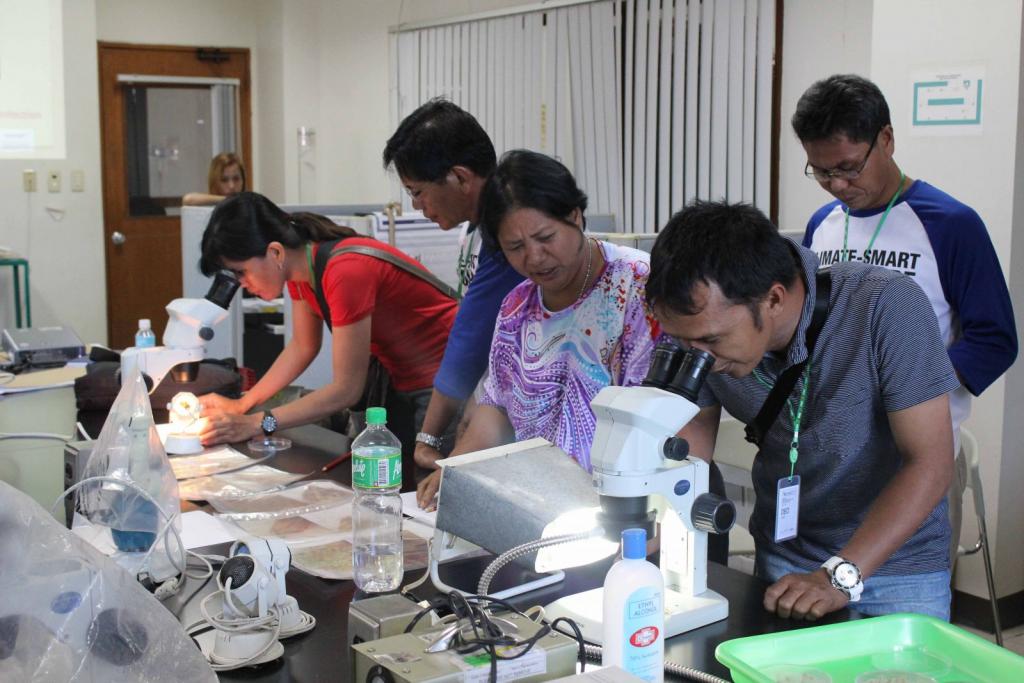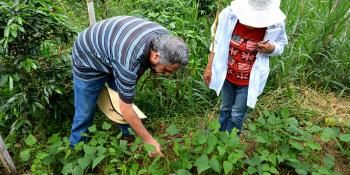The Infomediary Campaign: Reinventing instruction approaches to win young people’s minds

Enticing the youth to take interest on agriculture and climate change requires reinvention of teaching approaches.
PHILIPPINES—Getting their feet deep in paddies. Plowing fields. Working long hours under the sun. These are some age-old but still important farm activities that most young people of today are not likely to engage in.
“There is a long distance between the unattractiveness of farming to the youth and efforts to reverse this trend,” Dr. Gelia Castillo, an outstanding Filipino rural sociologist, observed.
Rising up to this challenge, a group of communication researchers at the Philippine Rice Research Institute (PhilRice) pioneered a Infomediary Campaign to bring back the love of young people for rice farming, to the point that they would consider it a viable career option. Central also to the campaign is to create alternative communication pathways in agricultural extension.
The campaign taps schools and teachers as the nucleus of agricultural extension. Using information and communication technologies (ICTs), students are then engaged as “infomediaries”, or information providers for rice farming and climate-smart agriculture (CSA).
In a short span of three years, the campaign has already received international recognitions, including a special commendation as one of the top five policy briefs during the Communication Policy Research: South 2014 conference and as a successful case in youth engagement at the 42nd Session of the United Nation’s Committee on World Food Security.
Small beginnings bring in good outcomes
Even with just over USD 2,000 initial fund, the Infomediary Campaign team courageously conducted week-long national training workshops for high school teachers from across the country at the PhilRice headquarters in Nueva Ecija, northern Philippines.

The campaign includes training for teachers on rice production and climate change. Photo: PhilRice
The teachers broadened their knowledge on rice farming and climate change through lectures from experts and field tours where various farm machinery and technologies were showcased. The teachers were also taught how to use PhilRice’s various information and social media platforms on rice farming and CSA. Tasked to integrate their learning into their curricula, the teachers passed the lessons learned to their students, and from infomediaries to their parents and their farming communities.
The campaign employs three major strategies: Read, Surf and Text.
Read: Students are provided with printed reading materials. This is especially helpful in remote areas where electricity is not available, thus, rendering information and communication technologies (ICTs) ineffective.
Surf: In areas where electricity and internet connectivity is not an issue, the students are taught to surf the Pinoy Rice Knowledge Bank, which contains a glut of information on rice farming and related topics. An offline version of the website is available is CDs.
Text: The campaign makes available a text center or SMS facility where students can send questions and receive answers to their concerns. At the start, the text center would receive queries on prevailing rice prices, indicative of parents seeking information through their children. Later, it would receive questions on appropriate rice varieties to plant and proper farm management.
All participating schools have been required to establish rice gardens to gain working and experiential knowledge, hence, molding them to be more effective and credible infomediaries. Other creative learning modalities like edutainment or education through entertainment are being implemented.
Initially, the campaign was only supported by the Technical-Vocational Unit of the Department of Agriculture and the Department of Agriculture-PhilRice. Later, the CGIAR Research Program on Climate Change, Agriculture and Food Security (CCAFS) in Southeast Asia started providing additional support, thus the integration of CSA into the campaign.
To date, the campaign involves over 200 high schools nationwide, of which 81 are vocational high schools.
Recounting experiences and lessons
Recently, a book titled, 'Youth and Agriculture: The Infomediary Campaign in the Philippines' was launched as an output of the campaign. The book was co-authored by the team comprising Jaime Manalo IV, PhilRice senior research specialist and research lead, Katherine Balmeo, Jayson Berto and Fredierick Saludez.
“Youth and Agriculture” is an interesting and engaging narrative that details the journey of the campaign. It is aligned with the rising interest and consciousness to actively engage the youth in agriculture. Dr. Calixto Protacio, PhilRice Executive Director, explained the average farmer’s age in the Philippines is now 57 years old. “The tough challenge is how to make farming rewarding [for young people],” he said.
The book presents best-fit practices in engaging young people in agriculture through social experiments and creative learning modes (e.g. mobility mapping, poster-making contest, etc.), fresh insights in doing field activities and reflections on how to do development work despite meager resources, to name a few.
In the book, Dr. Castillo lauds the Infomediary Campaign for its engaging pursuit, informative manner, and encouraging results. She stresses the following lessons that can be drawn from the campaign:
- Strong support from teachers and the instruction team of academic institutions is a key strength to its implementation.
- Focus on the goal, not on the tools. ICTs are tools to enhance extension work.
- The timing of field work is important. It must be early in the morning or late in the afternoon (when it is not yet scorching hot) to be “tolerable” for the students.
Intended for school teachers, researchers, agriculture extensionists, communication practitioners and interest groups, the book features key actors and champions that have significantly contributed to the success of the campaign. The section on successful infomediaries affirms the important role of students as influencers of their parents and the farming communities.
Mr. Manalo said, “We should have the mindset that the youth is a force to be reckoned with when it comes to ensuring a food secure future for generations to come. And this would require the brightest minds in agriculture from the youth sector.”
Download the book: Youth and Agriculture. The Informediary Campaign in the Philippines
Read more
- Climate change in the eyes of the youth
- Mobilizing the school youth as source of climate information
- Counting on public school teachers to promote climate-smart agriculture
- Schools as nuclei of climate change information
- Infomediary campaign recognized internationally
Bernadette Joven is Communications specialist for CCAFS Southeast Asia.




